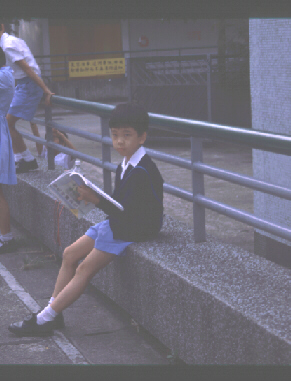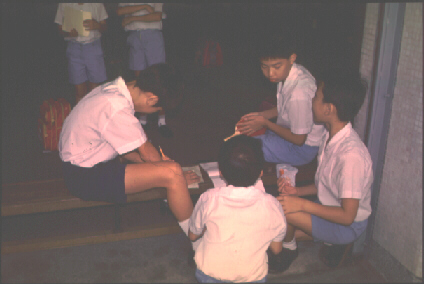
Heavy Shoulders
Primary students facing more pressure nowadays
by Emmy Lau
T he note left by Wong Chun Man says “Please forgive me for my poor results in school.” This 12-year-old boy with a broken family jumped from a North Point building on 5 September, 1995.
A recent study conducted by Professor Wong Chung Kwong, head of the Psychiatry Department at The Chinese University of Hong Kong, indicated that more than 200,000 Hong Kong school children encounter significant psychological problems and less than five percent get proper help.
Only after half and a month of the new term, there were seven cases of student suicides.
Miss Lee, who requested her full name be withheld, is a guidance teacher of three primary schools in Wong Tai Sin. She commented, “Primary students have to withstand more pressure than our generation did.
“They have more chances to get contact with different kinds of people and ideas. However, our society fails to provide necessary and suitable guidance for them, because we did not experience so much in our own past.”
Miss Siu Siu Yin, a teacher of Holy Angel’s Canossian School, agreed.
Said she: “The pressure is greater in this complicated society. People’s education level is higher. Parents are inclined to have their children receive higher education. This put more pressure on them.”
Miss Fung Ming Yin, 12, is studying Primary 6 in Wong Tai Sin Catholic Primary School. She finds that the worst thing about going to school is to finish all the mathematics assignments which are prepared for the Assessment Aptitude Test.
“School life is fun,” she said, “but whenever I think of the homework and examinations, I am not very happy at all.”
She said that she has seven to eight items of homework every day. She needs to spend three to four hours to finish them.
Besides normal lessons, she has to attend additional lessons of one and a half hour from Monday to Thursday. These extra lessons are used to prepare the Assessment Aptitude Test. She also has a private tutor for revisions. This takes her five to six hours every week.
Miss Pang Hoi Ching, a Primary 6 student studying at Canossa Primary School, has a similar workload. Besides twice pre-dictation and twice dictation a week, she has weekly quizzes on subjects like Health Education, Science and Social Studies.
Miss Siu also finds that her students receive great pressure.
She said, “Teachers and parents always remind students to work hard in order to be admitted to good secondary schools.
“This is especially true for the Primary 6 students. All their time goes to do exercises prepared for the Assessment Aptitude Test.
“Many students are totally lacking proper entertainment. It is unhealthy and their pressure cannot be released.”
According to Ming Yin and Hoi Ching, they cannot take up any outdoor activities or read any books other than text books.
Both of them experience pressure from parents and teachers for good academic results. Hoi Ching said that the teachers always stress that their results is important in upholding the fame of the school.
Besides the competitiveness of the classmates, the system of putting the best students in one class and excessive emphasis on academic results have also put pressure on children.
Both Miss Lee and Miss Siu said that family problems are the core of emotional problems among youngsters.
They said that there are increasing single-parent families among which husbands having extra-marital relationships is a growing factor.
“This kind of single-mothers are likely to expect more from their children. They project all their hopes on their children,” said Miss Lee.
Miss Lee also said that most of the youngsters find that they are being neglected and misunderstood. Parents after working a whole day are too tired to communicate with their children, even if they are free to do so.
Ming Yin said that she would not share her innermost feeling with her parents. “They do not always understand how I feel,” she said.
Even about the school life, she will report only the good news. “They will scold me if they know I am not good at school,” said she.
Ming Yin said that when her unhappiness is due to her parents, she will just turn to her dog. “The unhappiness will just vanish if I speak about it.”
When confronting conflict and pressure, Ming Yin will turn to her friends.
However, Hoi Ching is more reluctant to express herself to her family members.
Miss Siu said that society has taught children to be quiet and patient. Expressing one’s own feelings is still an odd thing.
Miss Siu said, “The interpersonal relationships have become less close now. Children are likely to have fewer friends. They are absorbed in computer games. Their social circle is thus restricted. They may experience tension and pressure when handling interpersonal relationships as their social skills is weaker.”
 Miss Lee said that she also had pressure of handling interpersonal relationship of students.
Miss Lee said that she also had pressure of handling interpersonal relationship of students.
“Some students have low self-esteem and are very passive,” she said. “They do not know how to be friendly. Sometimes, they are self-centered and the classmates refuse to play with them.
“Because of the beginning of psychological and physiological changes in adolescence, some students of Primary 5 or 6 have begun courtship. Sometimes, this kind of immature relationship places great pressure on the youngsters.” Miss Lee added.
Ming Yin and Hoi Ching both said that they will not talk about their own problems with class mistress nor guidance teacher.
Ming Yin said, “It seems strange to let your own teacher know too much about your own feelings.”
Miss Siu admitted that teachers should be more sensitive and take an active role in helping students.
“However,” she said, “we teachers do find a lot of difficulties in dealing with the emotional problems of students.
“First, time is the crucial point. Besides preparing the lessons and checking homework, we need to arrange a lot of extra-curricular activities. Free lessons are rare, only about three lessons weekly. We can only counsel upset students during recess and ten minutes before school. The students’ emotion in fact will not wait for us. We can’t provide immediate and intensive counselling.
“Second, most people still regard the job of teacher as teaching, not counselling. Even some teachers refuse to take up this job.”
Guidance teachers face similar difficulties. Most students will not take the initiative to talk to them.
Hoi Ching said that she will not come to the guidance teacher because only students who are naughty and badly behaved will need to see the guidance teacher.
Miss Lee complained that the promotion of guidance teachers is insufficient.
She also finds that the shortfall of guidance teachers hinders her job. She has to station at three different Primary schools in a week. Students do not recognize her. If they have problems they cannot talk to her immediately. Also, she cannot fully understand the schools, the teachers and the children, as she has to cope with so many of them.
According to the Education Department, a total of 194 student guidance teachers serve more than 800 primary schools. The ratio is 1 to 2,500 students. But Senior Inspector Amy Yuen Chan Yuen-big said the manpower was sufficient. She said unlike social workers, the main role of guidance teachers was not solving problems but cultivating a caring environment in schools.
Besides individual counselling provided by counsellors and teachers, parent-teacher associations are set up in many primary schools.
However, the real function is not yet clear.
Miss Siu explained that they are restricted to parents who are more active and more free to participate in school activities. However, problems always arise in those families where parents do not have time to see their children.
Miss Lee said that schools have put too much emphasis on academic results. Besides teachers and guidance counsellors, there is hardly any preventive or counteracting method to help emotionally disturbed children.
Miss Siu suggested that school should encourage students to join more group activities like Boy Scouts and the Community Youth Club. The students learn a lot of social skills through these activities.
Said Miss Siu, “It is unhealthy to put all the attention in getting good academic results, scratching prizes and scholarship. There is no use of being a bright student but with an unhappy, unhealthy mind.”

